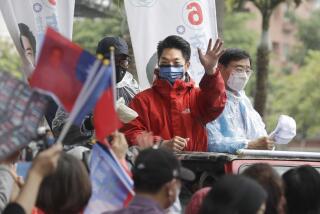Academic Freedom Prevails, Panel Says
American universities have generally defended academic freedom and resisted public pressure to penalize professors critical of the U.S. war on terrorism, panelists at a Los Angeles forum said Monday.
U.S. universities have turned back public demands to take action against academics who have called for the death of U.S. troops in Iraq, blamed “American colonialism” for the Sept. 11 terrorist attacks or jokingly praised the attack on the Pentagon. Universities have also resisted government attempts to review their research before publication for the potential disclosure of “sensitive information.”
At least so far, the panelists said, academic freedom has fared better today than during other times of national crisis -- including the Cold War and the attacks against alleged Communist sympathizers led by Sen. Joseph McCarthy in the 1950s.
“There are grounds for concern, but overall the reaction has been supportive of academic freedom,” said Michael Genovese, director of Loyola Marymount University’s Institute for Leadership Studies, which sponsored the forum exploring how the war on terrorism has affected academic freedom. “In a way, we have learned from history.”
Still, panelists noted some ongoing concerns.
John Akker of the London-based Network for Education and Academic Rights said foreign scholars, particularly from the Middle East and Africa, are finding new difficulties in obtaining visas to attend academic conferences in the United States.
Last year, the presidents of the National Academies of science, engineering and medicine warned that visa delays were hampering research collaborations with foreign scholars and jeopardizing the future of international conferences here.
A report last year by the American Assn. of University Professors found a significant drop in the enrollment of foreign students here and a backlog of 25,000 visa applications as of fall 2002. “The United States is in great danger ... of missing out on furthering its knowledge of foreign relations, information technology, applied engineering and science,” Akker said.
Panelists also expressed concerns about individual cases, including the treatment of Sami Al-Arian, formerly a tenured professor of Palestinian descent at the University of South Florida.
In December 2001, Al-Arian was notified, without a hearing, that he would be dismissed after a public uproar over his admission on a national TV show that he had called for “death to Israel,” among other statements.
Al-Arian was subsequently arrested on charges of supporting terrorist organizations, but was never granted the right of academic due process before then, said Robert M. O’Neil, director of the Virginia-based Thomas Jefferson Center for the Protection of Free Expression.
In several other cases, however, universities have resisted public pressure to penalize academics for their political views, O’Neil said.
The University of New Mexico reprimanded, but refused to dismiss, a professor who jokingly told his class after Sept. 11 that anyone “who can blow up the Pentagon gets my vote.” City College of New York resisted public pressure to censure faculty members who participated in a post Sept. 11 teach-in, where some blamed U.S. “colonialism” for the attacks.
Columbia University refused to discipline a faculty member who, during a teach-in on the Iraq war, called for “a million Mogadishus,” referring to the ambush and death of U.S. troops in Somalia. Columbia president Lee Bollinger, resisting a call for the professor’s dismissal from more than 100 congressional members and university alumni around the world, concluded that disciplinary action would be inappropriate under the principle of academic freedom.
Orange Coast College suspended and later cleared an instructor of charges he’d called four Muslim students “terrorists” and “murderers” in a class discussion about the Sept. 11 attacks. And the University of North Carolina rebuked public demands to remove from a recommended reading list a book on the Koran viewed by critics as overly sympathetic to Islam.
O’Neil said academic freedom is more vigorously supported today than during the McCarthy era. Academic and civil rights organizations are quicker to denounce perceived violations of academic freedom, he said, and several university officials involved in resolving the various incidents were 1st Amendment scholars -- “the right person at the right time,” O’Neil said.
In addition, he said, the excesses of the McCarthy era helped lead to the development of legal protections for academic freedom and related rights.
Another terrorist attack on U.S. soil could place new pressures on American academia to repress dissent against government policy, he said.
But, at the moment, “things could be a whole lot worse.”
More to Read
Start your day right
Sign up for Essential California for news, features and recommendations from the L.A. Times and beyond in your inbox six days a week.
You may occasionally receive promotional content from the Los Angeles Times.







